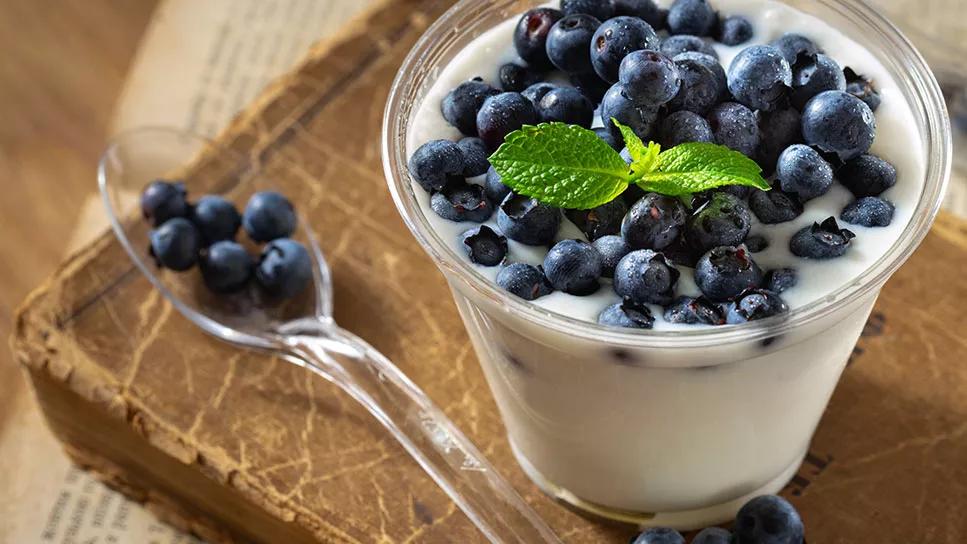Snacking can bring benefits with healthy food choices and planning

Image content: This image is available to view online.
View image online (https://assets.clevelandclinic.org/transform/75d5117b-f2a0-43b9-b88b-d199c9849432/yogurt-blueberry-snack-cup-1325354454)
Small cup of yogurt with fresh blueberries on top, with mint sprig
Snacking isn’t bad if it’s done right.
Advertisement
Cleveland Clinic is a non-profit academic medical center. Advertising on our site helps support our mission. We do not endorse non-Cleveland Clinic products or services. Policy
Surprised? Don’t be. Munching here and there during the day brings a full plate of benefits. It can curb food cravings, boost energy levels, rev up your metabolism, and spark your mind and muscles.
Planned snacking — with a definite emphasis on “planned” — can even help you maintain a healthy weight or lose unwanted pounds, says registered dietitian Kate Patton, MEd, RD, LD.
“Healthy snacking is a way to feed your body the nutrition it needs every few hours,” explains Patton. “It can leave you feeling more satisfied while maintaining your energy and blood sugar in a steady and balanced way.”
The “snacking” we’re talking about is different from “grazing,” or the unintentional and mindless consumption of whatever food is within reach. It’s not gobbling something down because you’re bored or stressed.
Instead, it’s a deliberate decision to fortify yourself between meals at a time when you feel your body beginning to lag.
And let’s be clear here: Most of us snack. More than 70% of Americans grab something extra to eat at least once a day, according to the 2023 Food and Health Survey from the International Food Information Council.
“Planning your snacks ahead of time sets you up for success,” says Patton. “Work it into your daily eating plan and how it fits into your overall calorie intake. Then, choose snacks that aren’t high in calories, bad fats, salt or sugar.”
Advertisement
So, what’s a healthy snack that’ll fill and fuel you up without piling on too many calories? Patton has some ideas. Here are 39 potential snacks divided into five categories to get you through the day.
NOTE: An * marks the snacks that have 10 grams or more of protein per serving. An ~ marks the snacks that are “grab and go” and don’t require refrigeration.
Advertisement
Consider the above list as nothing more than a starting point for healthy snacking. There’s a seemingly infinite number of food combinations to fit your specific tastes.
Spend some time reading food labels as you come up with your own snack creations. Try to use fresh ingredients whenever possible and stay away from processed foods high in empty calories, saturated fat, carbs and added sugars. Limit sodium, too.
“Look to pack in the whole grains, fruits, veggies and proteins,” advises Patton. “Odds are, you’ll find endless low-cal options in your cupboard and fridge if you search them out.”
Advertisement

Sign up for our Health Essentials emails for expert guidance on nutrition, fitness, sleep, skin care and more.
Learn more about our editorial process.
Advertisement
This color additive, found in many pre-packaged foods, may affect people with ADHD or allergies
With a focus on internal cues for hunger and fullness, this eating style may revolutionize your relationship with food
Review the ingredients, watch for sugar and fat, and choose one with the right amount of protein for your needs
Getting the hang of portions can help you better understand how much to put on your plate
A typical recommended balanced diet is half fruits and veggies, a quarter protein and a quarter grains
Foods high in protein, fiber and water can help keep hunger at bay
This quirky food trend is harmless, as long as you’re getting enough protein, fiber and healthy fats
With a little planning, you can fill your belly and boost your energy
Although it could be used as a moisturizer, this new trend is not recommended
Communicating clear limits helps protect your time, energy and emotional well-being
High cholesterol can be genetic, but testing and treatment can lower your heart disease risk